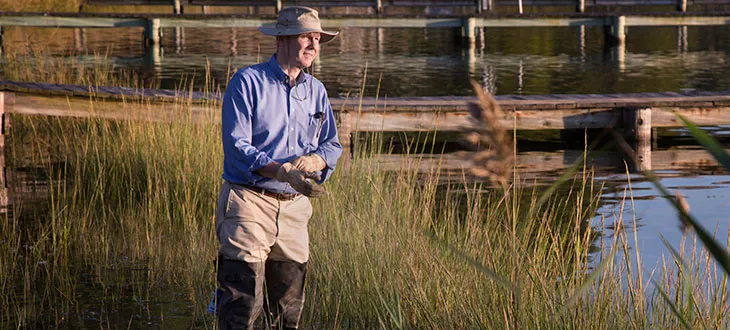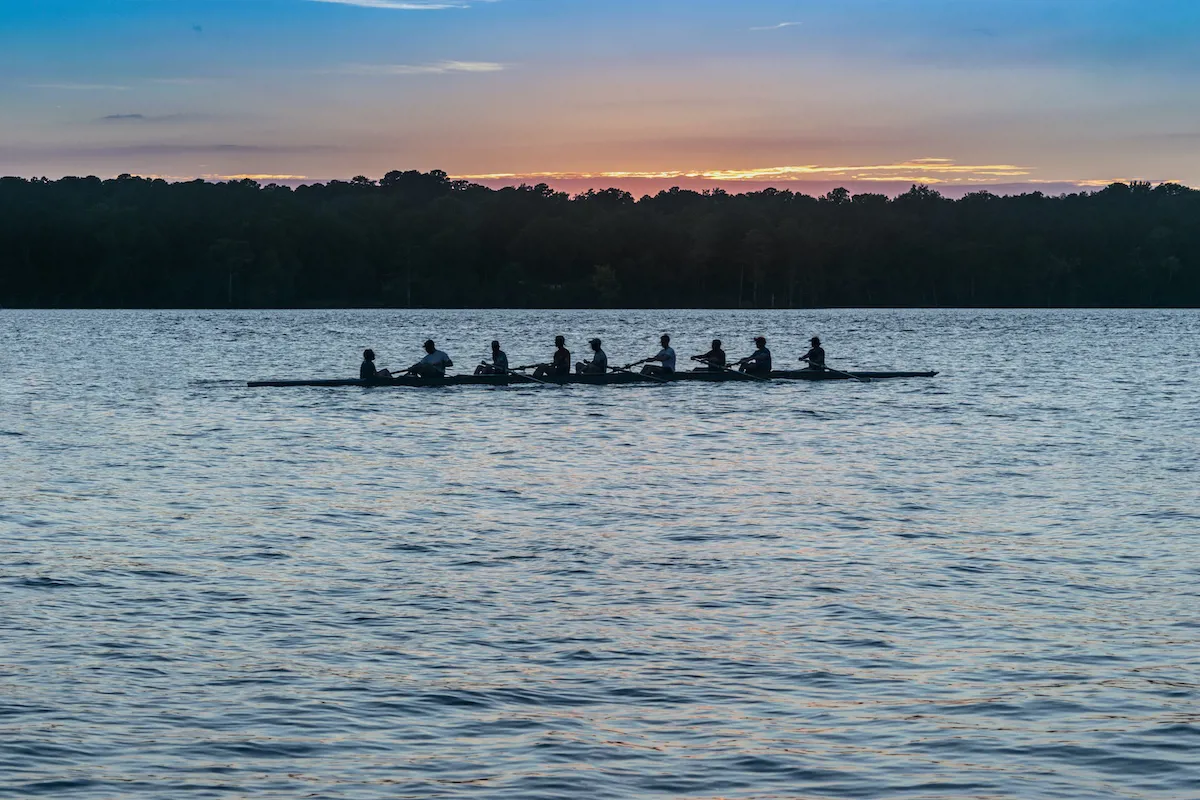- Home
- Waterfront Law
- Residential Riparian Rights Services

Ramone Photography
Our Team Can Help You Win Your Residential Case
Leading Virginia Residential Riparian Rights Services
Jim Lang and the Waterfront Law Team specialize in protecting the investment residential waterfront property owners made for their properties. Together, they have over 70 years of legal experience in environmental, riparian property rights, littoral rights, and maritime and admiralty law.
The team understands the ins and outs of state court litigation and federal court litigation and are confident in representing clients before agencies like the Virginia Marine Resources Commission, the U.S. Army Corps of Engineers, Local Wetlands Boards, City Councils, and Boards of Supervisors.
Waterfront Law is also a division of the full service, widely respected, law firm of Pender & Coward, P.C., with offices in Virginia Beach, Chesapeake and Suffolk. This bench strength allows the team to collaborate with over 35 attorneys on any nuance in any body of law. Whatever your case may be, Jim Lang and the Waterfront Law Team offers big firm expertise with one-on-one service.
What are Residential Riparian Rights Cases?
Residential riparian rights cases directly impact the littoral rights of waterfront property owners. Whether you’re looking to build a pier on your property or need help dredging a waterway to access the water again, Jim Lang’s advanced legal degree in environmental law has helped him acquire an extensive knowledge to help clients with their waterfront land development legal issues.
Jim Lang is an environmental attorney who assists waterfront property owners from around the Commonwealth of Virginia in protecting their riparian property rights.
Backed by his team at Waterfront Law, Jim Lang is passionate about protecting Virginians who live, work and play on the water. Together, the team boasts decades of experience practicing waterfront riparian property rights law, maritime & admiralty law, and environmental law. They are here to help protect the environments you love as a citizen of Virginia.

Xavier Ascanio/Shutterstock.com
Residential Riparian Rights Specialties
Pier Cases
Jim Lang and team specialize in representing clients at the Virginia Marine Resources Commission (VMRC) and US Army Corps of Engineers (USACE). Whether you need a permit to build a pier, prevent construction of a pier, or negotiate community boat slips, the Waterfront Law Team has the knowledge and experience to lead you to victory. Read more about our Pier Cases here.
Wetlands Cases
With a close working relationship with the VMRC staff, Jim Lang oversees multiple wetlands cases each year that favor his clients. If you need help obtaining a wetlands permit or have already been charged with a violation, the Waterfront Law Team is prepared to fight for you.
Boating or Fishing Rights Cases
As a waterfront property owner, you want to preserve your riparian right to use the lake or pond near your property. However, some water bodies are privately owned. Jim Lang and team can help you determine your bottomland waterfront property rights at lakes or ponds across Virginia.
Chesapeake Bay Preservation Cases
The Chesapeake Bay Preservation Act protects the land within 100 feet of the Chesapeake Bay and within 100 feet of water bodies that have perennial flow within the Chesapeake Bay Preservation Area. If you are facing enforcement action after building a structure or removing greenery on these protected lands, the Waterfront Law Team is here to help.
Dredging Cases
Has the waterway next to your waterfront property lost its depth, preventing you from enjoying recreational boating? Jim Lang and team provide years of experience helping waterfront property owners dredge waterways to get them back on the water again.
Aquaculture Cases
“Off the bottom” oyster aquaculture, if not carefully controlled, interferes with riparian property rights and reduces the value of waterfront properties. Jim Lang and team can help you protect your riparian property rights.
Our Team is Here to Help You - Get Your Consultation

Confluence of the Chickahominy River and the James River at Williamsburg, Virginia.
Residential Riparian Rights Case Victories
Pier Law Achievement
The Waterfront Law Team recently won a case where they represented the owners of a large community pier on the Potomac River in Northern Virginia. A member of the community who did not have a boat slip on the pier attempted to take away everyone else’s boat slips. After years of litigation, and a hard fought three-day trial in Fairfax County Circuit Court, our Waterfront Law Team Members helped deliver a victory for our clients.
Wetlands Law Achievement
In a recent VMRC hearing, a Chesapeake waterfront property owner decided to represent himself and was required to pay $27,500 in penalties for hiring a contractor to add fill dirt to his own backyard. When the regulators came after the contractor, the contractor hired the Waterfront Law Team. We found many mitigating factors which favored our client. After several weeks of dialogue between our attorneys and the VMRC, the Commissioner agreed to drop the case. Thus, our client avoided having to appear at a hearing and was saved from what could have been a very large fine.
Boating or Fishing Rights Achievement
Jim Lang and team represented a residential waterfront property owner at a reservoir where the Homeowners Association and the neighbor refused to relocate a pier that was in the wrong location. This spoiled our client’s view of the water. We forced the neighbor to relocate the pier to a more appropriate location and ensured our client was able to enjoy the view from his waterfront property.
Chesapeake Bay Preservation Achievement
The Waterfront Law Team represented residential landowners facing a Chesapeake Bay Preservation Act civil enforcement action in which the City demanded they pay a civil penalty and install new plantings at their waterfront property. The case was resolved to the clients' benefit as the City withdrew the Notice of Violation, dropped the demand for monetary civil penalty, and accepted the clients' landscaping plan instead of requiring the more costly plan designed by the City.
Residential Client Testimonials
Waterfront Property Dispute Success (5 Stars)
"I highly recommend Mr. Lang for your legal needs. I was thankful to receive a quick email response to my online inquiry which was promptly followed-up with a scheduled phone conversation. His firm conducted thorough research into our situation and helped us navigate a tricky property dispute quickly."
- Gita W.
Waterfront Law Expertise (5 Stars)
"Very happy we chose to work with James Lang!"
- Louisa P.
Homeowner & Homeowners Association Triumph (5 Stars)
“Jim Lang is a great attorney who has been representing our civic league for a couple years now. He has done a great job in getting all issues surrounding our community dealt with in a very professional manner; always trying to find a common ground and getting things done to benefit our community. Thank you for all you have done and continue to do for our 318 home community."
- Sam B.
Read More Testimonials from Our Satisfied Clients
Get Your Consultation

Kate Sfeir/Shutterstock.com
COMMONLY ASKED RESIDENTIAL RIPARIAN RIGHT QUESTIONS
Can I stop people from boating or fishing at the water body next to my waterfront property?
In Virginia, the bottomland at the lake or pond (the land under the water) is privately owned. The owner of the bottomland has the power to control boating, fishing and other activities on the water at the lake or pond. However, owning the property at the shoreline of the lake or pond is no guarantee that you own the bottomland.
The language in the waterfront property owner’s deed is crucially important. To learn more, check out our Do I control What Happens on the Water at my Waterfront Property on a Lake or Pond? blog post.
If you are thinking of purchasing waterfront property on a lake or pond you are going to pay a lot more for that property, as compared to a similarly situated property away from the water. It is expensive and it brings up a very complicated area of the law requiring special expertise in riparian and littoral rights. You should contact us before you sign on the dotted line so that we can help you understand your rights on the water.
What is your experience in handling cases dealing with piers?
Our four-attorney team handles a large number of pier cases - it is the most active area of our legal practice. Our article titled “How to Build a Pier in Virginia? Waterfront Property Rights Explained” shares a lot of our legal knowledge on this area of the law.
Some of our clients object to a neighbor’s plan to build a pier. We recommend paying special attention to the “Adjacent Property Owner” form, ensuring you send it accurately and on time to the Virginia Marine Resources Commission. We have represented clients before the Virginia Marine Resources Commission and the U.S. Army Corps of Engineers on a variety of pier cases.
In one of those cases, we showed that the proposed pier interfered with the client’s riparian right of navigation. We were able to force the owner of a partially constructed pier to tear it down.
We have also helped people who are having trouble building a pier due to an objection from a neighbor. Our work with a hydrographic surveyor forced the neighbor to withdraw the objection so that our client could build a pier, which he and his family are using and enjoying now.
Your waterfront property is expensive. The riparian property rights that you acquired when you bought a waterfront property are a major part of your property value. Building a pier in your riparian area is one way to protect and maximize those riparian property rights. Putting a stop to an improper pier that interferes with your riparian property rights is another way to protect the value of your property. Our Waterfront Property Law attorneys know how to do both.
What should I do if I am being prosecuted by the wetlands board?
Our team of Waterfront Property Law attorneys has represented a number of clients facing prosecution by a Local Wetlands Board or the Virginia Marine Resources Commission. (The VMRC has jurisdiction when the locality chooses not to establish a Local Wetlands Board).
Sometimes our clients were prosecuted under the Virginia Coastal Primary Sand Dunes and Beaches Act, but more often we defend clients on an enforcement action brought under the Virginia Tidal Wetlands Law.
The most important thing to do in this situation is to obtain legal counsel. This is best illustrated by one of our cases in which two people were prosecuted for the same violation. The person who was prosecuted first decided to represent himself and ended up being forced to pay $27,500 in out of pocket expenses (civil penalty and cost to purchase wetlands credits from a mitigation bank).
The second person retained one of our attorneys to defend him. Working closely with the enforcement staff at the Virginia Marine Resources Commission, we found many mitigating factors which favored our client. After several weeks of dialogue between our attorneys and the VMRC, the case against our client was dropped.
I am thinking about making an offer on a residential waterfront property but before doing so, can you help me confirm that I will be able to build a pier?
Because waterfront property is so expensive and Virginia is a caveat emptor (buyer beware) state, you should be careful before you sign that contract to purchase any waterfront property. We have had more than one case where a person bought waterfront property thinking they could boat or fish on the water next to their property, or build a pier, but learned otherwise after closing on the property and moving in.
The owner who sold you the property could have previously sold the riparian property rights to someone else, which will spoil your plan to build a pier where you were going to tie up your boat. Check out our Riparian Rights Overview that describes how riparian property rights can be severed from the rest of the property.
Another trap for the unwary waterfront property owner is the situation where there is a strip of land (owned by someone else) that separates your property boundary from the waterline. Title insurance could help but in most situations the boilerplate in the policy language contains an exception that excludes riparian property rights from coverage under the policy.
A person thinking about purchasing waterfront property should check with a riparian property rights attorney before making the purchase. The attorneys on our Waterfront Property Law Team know how to help.

Rappahannock River at Fredericksburg, Virginia / Photosbyandy/Shutterstock.com
Residential Riparian Rights Resources
How Riparian Rights Create High Waterfront Property Prices In Virginia
The Virginia Supreme Court in 2012 wrote that the “riparian nature” of waterfront property “is often a substantial, if not the greatest, element of its value.” But precisely how much extra do people pay to live on the water?
Waterfront Property Owners: Riparian Rights & Oyster Aquaculture
Riparian property rights are the reason that people pay extra to live on the water. “Off the bottom” oyster aquaculture, if not carefully controlled, interferes with riparian property rights and reduces the value of waterfront property.
How To Build A Pier In Virginia? Waterfront Property Rights Explained
One of the most common reasons to live on the waterfront is to gain access to deeper water by way of a pier. However, building a pier is not as easy as it seems.
Residential Law Webinars
Living Shoreline Law Webinar
Review the new mandate in Virginia Code § 28.2-104.1(D). Uncover the goal of a living shoreline, the difference between a living shoreline and a hardened shoreline, and the impact the new law will have on commercial and residential waterfront property owners.
Dredging in Virginia Webinar
Learn all about dredging: its various types, requirements, costs, and impact on both the local and national economies. We outline the permit process for dredging projects, revealing our recommendations and best practices.
Contact Our Team of Experienced Lawyers
Fill in the information (to the right) to reach Jim Lang and his team.
Contact Jim Lang
Email: jim@fhp-va.com
Phone: (757) 777-6382
Maritime Emergency?
Call or text Tom Berkley 24 hours a day
Phone: (757) 572-2657